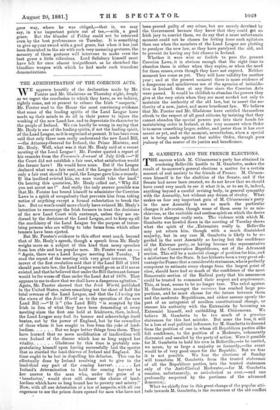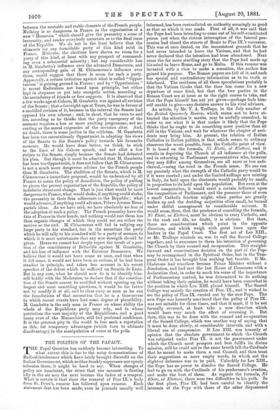M. GAMBETTA AND THE FRENCH ELECTIONS.
THE success which M. Clemenceau's party has obtained in rendering Belleville hostile to M. Gambetta, makes the result of to-morrow's general elections a matter for a certain amount of real anxiety to the friends of France. M. C16,men- ceau himself is for the abolition of the Senate, and if the Senate had never been created, we do not know that we should have cared very much to see it what it is, or to see it, indeed, anything beyond a careful revising body, in general sympathy with the Assembly, but without any dream of rivalry. What makes us fear any important gain of M. Clemenceau's party in the new Assembly is not so much the particular changes it advocates, though some of them seem to us mis- chievous, as the excitable and restless spirit on which the desire for these changes really rests. The violence with which M. Gambetta was howled down in the meeting of Tuesday shows what the spirit of the .Extremists really is. Belleville may yet return him, though with a much diminished majority, but in any case M. Gambetta is likely to be re- garded in the next Assembly as having lost the confidence of the Extreme party, as having become the representative only of the Conservative Republicans, not of the Advanced section. This will be a material change of position for him, and a misfortune for the State. It has hitherto been a very great ad- vantage for France that a considerable statesman, who is perfectly competent to estimate every change from the largest point of view, should have had so much of the confidence of the most Democratic section of the Radical party that his assurances could be trusted to command their respect and acquiescence. This, at least, seems to be no longer true. The cabal against M. Gambetta amongst the on criers has reached large pro- portions, .and he must choose for the future between them and the moderate Republicans, and either assume openly the part of an antagonist of needless constitutional change, or' resume his authority with the Extremists by becoming an Extremist himself, and cutbidding M. Clemenceau. We believe M. Gambetta to be too much of a genuine statesman for this last mistake. But none the less, it will be a loss of real political influence, for M. Gambetta to descend from the position of one in whom all Republican parties alike felt confidence, to the position of a Moderate, vehemently distrusted and assailed by the party of action. Were it possible for M. Gambetta to hold his own in Belleville,—to be carried, we mean, by as large a majority as formerly,—the event would be of very good omen for the Republic. But we fear
it is not possible. We fear the elections of Sunday will transform M. Gambetta from the trusted statesman of all the Republican parties, into the trusted statesman only of the Anti-Clerical Moderates,—for M. Gambetta remains, unfortunately, as anti-clerical as ever,--and one profoundly suspected by the partisans of the advanced democrecy. What we chiefly fear in this great change of the popular atti- tude towards M. Clambetta, is the recurrence of the old conflict
between the unstable and stable elements of the French people. Nothing is so dangerous in France as the organisation of a new " Mountain " which should give the peasantry a sense of insecurity, and render everybody uncertain as to the final issue of the Republic. We do not in the least believe that the elements for any formidable party of this kind exist in France. Hitherto, the elections have shown no room for a party of this kind, at least with any prospect of command- ing even a substantial minority ; but any considerable loss in M. Gambetta's influence over the advanced Democrats, and any corresponding gain of M. Clemenceau's influence over them, would suggest that there is room for such a party. Apparently, a certain irritation against what is called "Oppor- tunism" is gaining ground in France ; and by " Opportunism" is meant Radicalism not based upon principle, but either kept in abeyance or put into energetic action, according as the ascendancy of friends or foes suggests. It is observed that a few weeks ago at Cahors, M. Gambetta was against all revision of the Senate ; that a fortnight ago at Tours, he was in favour of a modified revision of it, because in the interval the Senate had opposed his own scheme ; and, in short, that he veers to and fro, according as he thinks that the party emergency of the moment requires a less or more exciting programme, not ac- cording as the moral exigencies of the occasion alter. And, no doubt, there is some justice in the criticism. M. Gambetta has been too ostentatiously Opportunist in adapting his views of the Senate to the Senate's policy towards his favourite measure. He would have done better, we think, to stick to the lines of his Cahors speech, and not allot a few stripes to the Senate, simply because the Senate had defeated his plan. But though it must be admitted that M. Gambetta has been too Opportunist, it does not follow that M. Clemenceau is not a much more dangerous adviser for the French people than M. Gambetta. The abolition of the Senate, which is M. Clemenceau's immediate proposal, would be understood by all France to mean the policy of demolition, the policy of pulling to pieces the present organisation of the Republic, the policy of indefinite structural change. That is just what would be most dangerous to Prance, what would shake, if anything could shake, the peasantry in their firm adherence to the Republic ; what would advance, if anything could advance, Prince Jerome Bona- parte's ideas. As we have said, we have absolutely no fear of the adoption of such a policy. The French peasantry have the fate of France in their hands, and nothing would suit them less than organic changes of which they could not see either the motive or the end. M. Clemenceau will fail in rallying any large party to his standard, but in the meantime the party which he will rally to his standard will be a party of menace, to which it is most unfortunate that any new strength should be given. Hence we cannot but deeply regret the revolt of a por- tion of the constituency of Belleville against M. Gambetta, and his loss of influence with the Extreme Democrats. We believe that it would not have come so soon, and that when it did come, it would not have been so serious, if he had been steadier in principle, and taken less account in his recent speeches of the defeat which he suffered on Scrutin de Liste. But in any case, what he should now do is to identify him- self boldly with the Moderates, to declare that if the constitu- tion of the Senate cannot be modified without opening up the largest and most unsettling questions, it would be far better not to modify it at all, and to clear away as soon as he can the foundations of that accusation that he is a time-server to which recent events have lent some degree of plausibility. M. Gambetta is the only man in France on whose ability the whole of the Republican party may rely, and in whose patriotism the vast majority of the Republicans, and a good many even of the Monarchists, still feel profound confidence. It is the greatest pity in the world to lose such a reputation as this, for temporary advantages (which turn to ultimate disadvantage) in the manipulation of votes at the polls.































 Previous page
Previous page